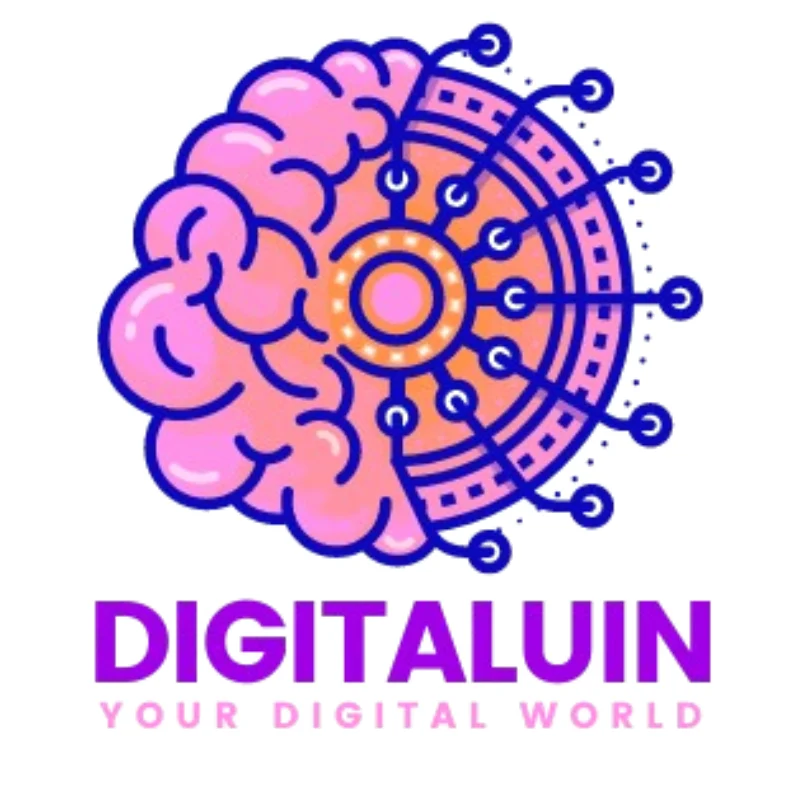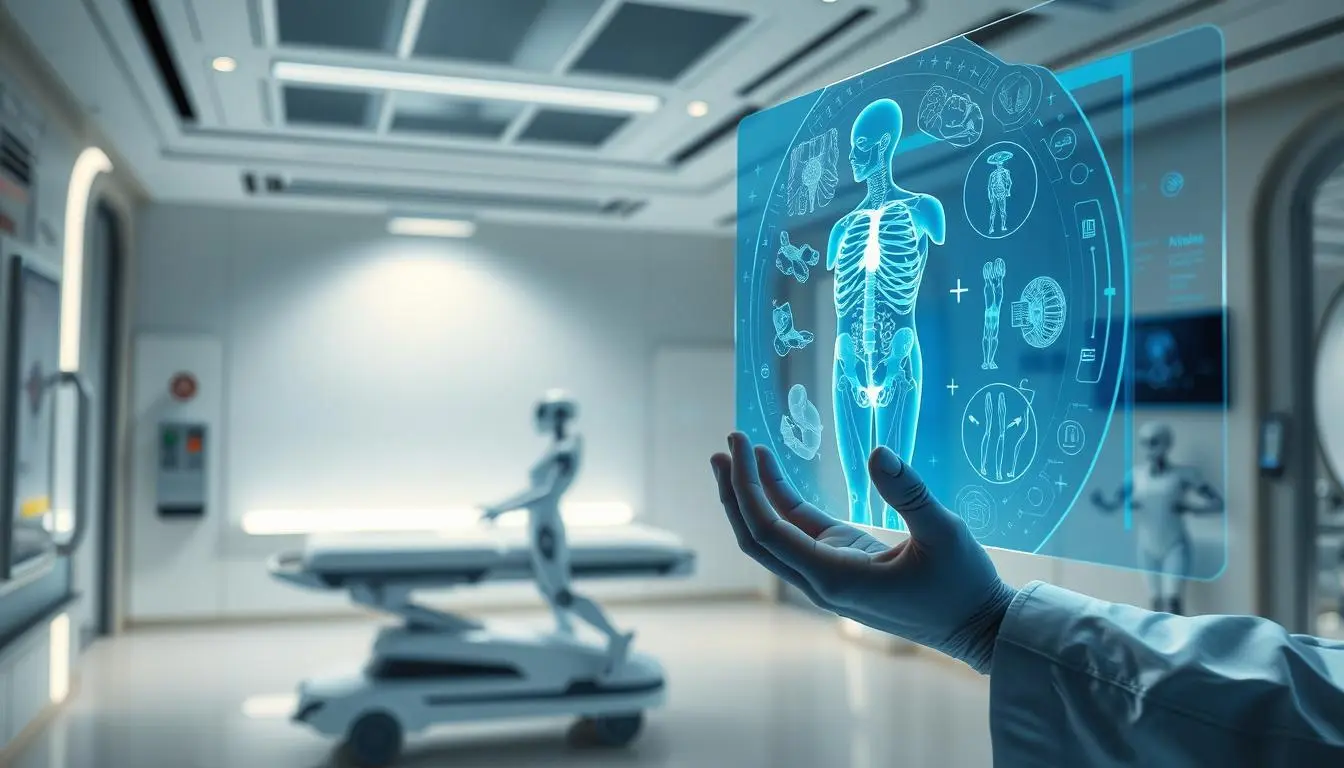The Future of AI in Healthcare: 5 Breakthroughs to Watch
Looking ahead, artificial intelligence is changing how we care for patients. It’s a big deal. Cutting-edge technology is making the healthcare industry better. It helps doctors make accurate diagnoses and find the best treatments.

Big changes are coming to medical care. This article will show you five major breakthroughs that will change everything.
Table of Contents
The Evolution of AI in Healthcare
Artificial intelligence in medicine has changed patient care and treatment. AI has progressed from simple programmed algorithms to advanced neural networks capable of autonomous learning. This change has greatly improved healthcare.
From Basic Algorithms to Advanced Neural Networks
Initial AI implementations in medical settings utilized basic flowchart-like models for decision making. These early systems were limited to narrow, predefined functions. Modern AI systems can process and interpret vast datasets from medical imaging and records
Harvard scientists have developed a highly versatile AI model for cancer diagnosis. This shows how advanced neural networks can improve diagnosis.
These new tools help doctors make better decisions. They can give patients care that fits their needs. Predictive analytics in AI can forecast health trends and reduce hospital revisits.
Key Milestones in Healthcare AI Development
There have been many important moments in AI’s growth in healthcare. One big step was Google Health’s Med-PaLM. It was made to answer medical questions well. This makes it easier to find reliable health information.
| Milestone | Description | Impact |
|---|---|---|
| Development of Basic Algorithms | Initial AI systems capable of performing simple tasks | Laid the foundation for future AI advancements |
| Introduction of Machine Learning | Enabled AI to learn from data and improve over time | Improved diagnostic accuracy and predictive capabilities |
| Advanced Neural Networks | Complex networks capable of analyzing vast amounts of data | Enhanced patient care through personalized treatment plans |
As AI keeps getting better, we’ll see more new uses in healthcare. These innovations will transform how healthcare professionals and patients communicate and collaborate.
The Evolving Role of AI in Modern Medicine
AI is set to fundamentally alter global healthcare methodologies in unprecedented ways. As you look into AI in healthcare, you’ll see a lot of growth and new ideas. Top companies are working together to make healthcare better.
Market Size and Growth Projections
The AI in the healthcare market is growing fast. Experts say we’ll see more AI in healthcare soon. This is because healthcare needs to be more efficient and effective.
Industry forecasts indicate exponential growth in AI-driven healthcare solutions. This is thanks to better machine learning, natural language processing, and computer vision. As a result, providers are heavily investing in AI to optimize operations and outcomes.
Leading Companies Driving Innovation
Some big names are leading the way in AI in healthcare. Tech leaders like Microsoft and NVIDIA, alongside biotech firms, are driving innovation. They’re working together to change how we do clinical research, find new drugs, and care for patients.
Innovators are developing specialized AI applications for niche medical fields. For example, NVIDIA’s AI helps with medical images, and Microsoft’s Azure AI helps with data analysis.
Recent Technological Advancements
Recently, AI in healthcare has made big strides. New machine learning algorithms are making predictions more accurate. Also, natural language processing is making it easier for patients and doctors to talk through virtual assistants and chatbots.
These new techs are changing healthcare for the better. They help doctors give more personalized care. As AI keeps getting better, we’ll see even more exciting changes in healthcare.

Why AI is Revolutionizing Medical Care Delivery
Artificial intelligence is reshaping how diseases are identified, therapies are administered, and individuals participate in their own care. It addresses long-standing inefficiencies while enhancing precision medicine.
Addressing Critical Healthcare System Inefficiencies
AI is fixing big problems in healthcare. AI sifts through multidimensional data to identify anomalies. For example, AI helps hospitals manage patients better, cutting down wait times.
Key Benefits:
- Improved resource allocation
- Enhanced operational efficiency
- Reduced wait times
Meeting the Demands of an Aging Population
The world’s population is getting older, putting more pressure on healthcare. AI is making care more tailored and proactive. AI helps keep an eye on patients with long-term conditions, preventing serious problems.
Reducing Clinician Burnout and Administrative Burden
Doctors are getting burned out, mainly because of too much paperwork. Automation through AI streamlines administrative workflows such as record-keeping. Doctors can dedicate more personalized attention to patients, enhancing both care quality and professional fulfillment.
| Task | Manual Time | AI-Assisted Time |
|---|---|---|
| Data Entry | 30 minutes | 5 minutes |
| Documentation | 60 minutes | 15 minutes |
| Patient Follow-up | 45 minutes | 10 minutes |
AI streamlines workflows by converting outdated paper-based tasks into seamless digital operations. This enhances both clinical decision-making and operational productivity.
Breakthrough #1: AI-Powered Diagnostic Imaging
AI is changing how we diagnose diseases. It enhances detection rates while minimizing diagnostic errors. This means you might get better care faster.
Computer Vision Algorithms in Radiology
Computer vision algorithms are key in AI imaging. They spot things doctors might miss. AI-powered imaging analysis can detect malignancies at their earliest stages.
Early Disease Detection Capabilities
AI imaging is great at finding diseases early. It looks at images in ways humans can’t. Detecting conditions at their onset dramatically increases the likelihood of positive outcomes.
| Disease | Traditional Detection Method | AI-Enhanced Detection Method |
|---|---|---|
| Cancer | Visual examination of images by radiologists | AI analysis for pattern recognition and anomaly detection |
| Cardiovascular Disease | Manual measurement of vascular dimensions | Automated analysis of vascular health using AI algorithms |
| Neurological Disorders | Visual inspection of MRI scans | AI-driven analysis for early signs of neurological degeneration |
Real-World Implementation Success Stories
Hospitals are starting to use AI imaging, and it’s working well. For example, a hospital in the U.S. cut down on missed cancer diagnoses. Real-world implementations demonstrate AI’s transformative potential in medicine.
AI imaging will keep getting better. Patients benefit from faster, more precise medical assessments. Your health will likely improve because of it.
Breakthrough #2: Predictive Analytics for Patient Outcomes
AI-driven predictive analytics are changing healthcare. Now, doctors can predict patient outcomes and adjust care plans. Personalized medicine becomes achievable with proactive AI insights.
Machine Learning Models for Health Event Forecasting
Machine learning models are getting better at forecasting health events. They look at huge amounts of data, like electronic health records (EHRs), medical images, and genetic info. This helps predict how patients will do.
Platforms like Tempus leverage AI to tailor therapeutic strategies. They analyze complex patient data. Clinicians gain data-driven recommendations for optimized treatment plans..
Preventing Hospital Readmissions and Complications
Predictive analytics can spot patients at risk of readmission or complications. AI cross-references historical trends with real-time health metrics. AI-generated risk assessments enable preemptive medical interventions.
This early action not only helps patients but also saves money. It reduces the need for expensive treatments and readmissions.

Integration with Electronic Health Records
Linking predictive analytics with EHRs is key to its success. It uses EHR data for better forecasts and insights. This helps doctors give more focused care.
This connection also helps create advanced predictive models. They can look at many data points, from medical history to current vital signs.
Breakthrough #3: AI-Driven Drug Discovery and Development
AI is changing how drugs are made. It’s making the process faster and safer. This is thanks to artificial intelligence in healthcare.
Researchers leverage AI to analyze complex biomedical datasets. This makes finding new drugs quicker and more precise.
Accelerating Pharmaceutical Research Timelines
AI is speeding up drug discovery. Companies like Genentech and NVIDIA are working together. They’re making a new platform using AI.
This partnership aims to cut down the time and cost of new drugs. Machine learning helps find new patterns in data. This speeds up research and opens new ways to treat diseases.
Identifying Novel Therapeutic Compounds
AI helps find new drugs. It looks through lots of data to find what’s been missed. This accelerates and refines pharmaceutical research.
Already, some AI-discovered drugs are in trials. AI’s role in finding new drugs is growing. This is driving innovation in the industry.
Optimizing Clinical Trial Design and Recruitment
AI is also improving clinical trials. It finds the right patients for trials. This makes trials more successful and saves money.
AI also helps design better trials. It picks the best outcomes and patient groups. This increases the consistency and applicability of findings.
Looking ahead, AI will be key in healthcare. It will help make treatments better and more tailored. This is exciting for the future of healthcare.
Breakthrough #4: Virtual Health Assistants and Chatbots
Smart AI-powered assistants are revolutionizing the way patients and providers connect and communicate. They enhance clinical workflows while elevating care standards. These tools change how patients talk to doctors, making it more efficient and tailored to each person.
Natural Language Processing in Patient Communication
AI-powered assistants interpret patient queries with human-like understanding. This lets them communicate with patients more effectively. Natural Language Processing (NLP) helps them grasp the subtleties of human speech, giving patients accurate answers to their questions.
This enhances patient satisfaction while easing administrative burdens. It lets them handle more complex tasks.
24/7 Symptom Assessment and Triage
These tools offer 24/7 symptom assessment and triage. They provide patients with quick advice and support. AI algorithms help them figure out symptoms, find possible causes, and suggest actions, helping avoid unnecessary hospital visits.
This is very helpful for patients with ongoing health issues. They need constant monitoring and support.
Improving Patient Engagement and Adherence
Digital health tools improve patient follow-through and communication. They send personalized reminders, educational materials, and support. This helps patients be more involved in their care, leading to better health and happiness.
For example, Biofourmis is using AI to change how we manage chronic conditions. These breakthroughs highlight AI’s expansive influence on modern medical science.
Breakthrough #5: Robotic Process Automation in Healthcare Administration
Robotic process automation is changing healthcare administration. It makes tasks easier and more efficient. RPA helps simplify work, cut down on mistakes, and improve patient care.
Automating Medical Coding and Billing Workflows
RPA is making a big difference in medical coding and billing. It uses AI to code diagnoses and procedures accurately. This reduces claim denials and boosts revenue cycle management.
Benefits of RPA in Medical Coding and Billing:
- Improved accuracy in coding and billing
- Reduced claim denial rates
- Enhanced revenue cycle management
- Decreased administrative workload
Streamlining Prior Authorizations and Claims Processing
Robotic process automation expedites insurance approvals and billing. These tasks used to take a lot of time. Now, they’re faster, thanks to RPA.
| Process | Manual Processing Time | RPA Processing Time |
|---|---|---|
| Prior Authorizations | Several days to weeks | Within hours or minutes |
| Claims Processing | Days to weeks | Within 24 to 48 hours |
Measuring Administrative Efficiency Improvements
To see the full benefits of RPA, you need to track its impact. Look at processing time, accuracy, and staff productivity. You’ll see big improvements in these areas.
Exploring RPA in healthcare administration can greatly benefit your organization. It drives both operational excellence and superior health outcomes.
Ethical Considerations in Healthcare AI
Artificial intelligence is changing healthcare, but it brings new ethical challenges. AI’s power to improve healthcare is huge. Yet, the ethical issues it raises are just as significant.
Patient Privacy and Data Security Challenges
AI in healthcare deals with a lot of sensitive patient data. Ensuring data confidentiality remains a critical priority. You need to think about data breaches and how to prevent them, like using strong encryption and secure storage.
Data anonymization is also vital. It enables ethical AI deployment while safeguarding sensitive information. Methods like differential privacy and data masking help strike a balance.

Addressing Algorithmic Bias and Health Disparities
AI models may inherit biases present in their training datasets. This can make health disparities worse. It’s important to use diverse data to train AI to avoid this.
Regular auditing of AI for bias is also key. This means checking AI’s performance across different groups and adjusting it to be fair and equal.
Developing Responsible AI Governance Frameworks
Creating strong AI governance is essential. You need clear rules and regulations for AI in healthcare. These should cover transparency, accountability, and patient safety.
The Importance of Human Judgment in AI-Assisted Medicine
Despite AI’s proficiency in handling repetitive tasks, human expertise continues to play a critical role. Having doctors check AI decisions helps catch mistakes. It ensures AI is used responsibly.
Thoughtful integration ensures AI benefits all stakeholders. This way, you can reduce the risks of using AI in healthcare.
Implementation Strategies for Healthcare Organizations
Integrating AI into healthcare demands both organizational adaptability and a shift in mindset. It’s about a full plan that covers tech, operations, and culture. As you work to add AI to your health care team, several important steps help ensure success. Such approaches optimize the effectiveness of AI-enhanced medical solutions.
Building the Necessary Technical Infrastructure
A strong tech base is key for AI success. This means having the right hardware, software, and data systems. You must check your current setup and see what needs to change for AI.
Think about how your tech can grow with your data and AI needs. It’s also important for different systems to work well together for easy data sharing.
Training Clinical and Administrative Staff
Teaching staff to use AI is vital. Both doctors and office workers need to know how to use AI tools and understand their results. You should create training that meets the needs of your team.
Training should keep going, with updates on new AI features and how to use them. This helps your team get better at using AI for better patient care and workflow.
Change Management Approaches for AI Adoption
Bringing AI to healthcare is about managing change too. You need a plan for how AI will affect your team and work. This includes telling staff about AI’s good and bad sides, getting them involved, and helping them through changes.
Creating a culture that welcomes new ideas and change makes adopting AI easier. This way, you can make the most of the future of healthcare innovation.
Measuring Return on Investment from AI Solutions
To show AI is worth it, you must track its effects. Look at how AI improves care and cuts costs. This shows if AI is making a difference.
Checking AI’s return on investment helps you improve your plans. It shows future opportunities for healthcare industry.
How AI Will Transform Patient Experiences
AI enables hyper-personalized care while optimizing resource allocation. The future looks bright, with AI set to change how we get medical care.
Creating Personalized Care Pathways
AI is making personalized care pathways for each patient. It uses lots of data to find the best treatment plans. This elevates both the quality and efficacy of medical services.
AI helps doctors make smarter choices. It can guess how patients will react to treatments. The result is higher-quality treatment and improved patient satisfaction.
| Benefits of Personalized Care | Description | Impact |
|---|---|---|
| Tailored Treatment Plans | AI analyzes patient data to create customized treatment plans. | Improved patient outcomes and satisfaction. |
| Predictive Analytics | AI predicts patient responses to different treatments. | More informed decision-making for healthcare providers. |
| Enhanced Patient Engagement | Personalized care plans encourage active patient participation. | Better adherence to treatment plans and improved health outcomes. |
Expanding Access to Specialized Medical Expertise
AI is making specialized medical expertise available everywhere. Telemedicine and AI tools let patients get top-notch care without visiting big hospitals.
This is key for fairness in healthcare. Geographic barriers diminish as AI democratizes access to expert care.
Empowering Patients Through Health Data Insights
AI translates complex health data into practical patient guidance. It uses data from wearables and health records to help patients understand and improve their health.
The Future of Home-Based and Remote Care
AI is changing healthcare to be more home-based. AI monitoring and virtual assistants let patients get care at home.
This makes care more comfortable and cuts down on hospital workloads. Hospitals can focus on urgent cases.
Conclusion: Embracing the AI-Enabled Healthcare Future
Exploring artificial intelligence in healthcare shows a bright future. Cutting-edge AI methodologies are changing medical practices. This includes AI in diagnostic imaging and robotic automation.
The ripple effects include cost savings and improved patient outcomes. AI is not just a trend; it’s a big change in healthcare delivery.
Staying informed on AI advancements is crucial for healthcare evolution. Patients receive data-backed guidance for informed health decisions. Staying informed helps you adapt to new technologies and methods.







